Sahelian kingdoms

The Sahelian kingdoms were a series of kingdoms or empires that were centered on the sahel, the area of grasslands south of the Sahara. The wealth of the states came from controlling the trade routes across the desert. Their power came from having large pack animals like camels and horses that were fast enough to keep a large empire under central control and were also useful in battle. All of these empires were also quite decentralized with member cities having a great deal of autonomy.
The Sahel states were limited from expanding south into the forest zone of the Ashanti and Yoruba as mounted warriors were all but useless in the forests and the horses and camels could not survive the heat and diseases of the region.
Economy
There were integrated kingdoms and empires, with substantial cities and significant towns; and less organised territories with large scattered populations. People practised agriculture, stock-rearing, hunting, fishing, and crafts (metalworking, textiles, ceramics). They navigated along rivers and across lakes, trading over short and long distances, using their own currencies.At Taghaza, for example, salt was exchanged; at Takedda, copper.
History of Sahel kingdoms
- The first major state to rise in this region was the Kingdom of Ghana. Established in c. the 8th century, it was centered in what is today Senegal and Mauritania, it was the first to benefit from the introduction of pack animals by Wolof traders. Ghana dominated the region between about 750 and 1078. Smaller states in the region at this time included Takrur to the west, the Malinke kingdom of Mali to the south, and the Songhai centred on Gao to the east.
- When Ghana collapsed in the face of invasion from the Almoravids, a series of brief kingdoms followed, notably that of the Sosso; after 1235, the Mali Empire rose to dominate the region. Located on the Niger River to the west of Ghana in what is today Niger and Mali, it reached its peak in the 1350s, but had lost control of a number of vassal states by 1400.
- The most powerful of these states was the Songhai Empire, which expanded rapidly beginning with king Sonni Ali in the 1460s. By 1500, it had risen to stretch from Cameroon to the Maghreb, the largest state in African history. It too was quite short-lived and collapsed in 1591 as a result of Moroccan musketry.
- Far to the east, on Lake Chad, the state of Kanem-Bornu, founded as Kanem in the 9th century, now rose to greater preeminence in the central Sahel region. To their west, the loosely united Hausa city-states became dominant. These two states coexisted uneasily, but were quite stable.
- In 1810 the Fulani Empire rose and conquered the Hausa, creating a more centralized state. It and Kanem-Bornu would continue to exist.
Maps
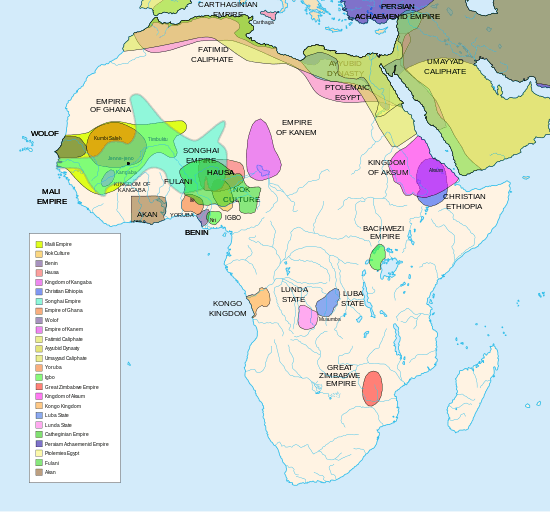 African states between 500 BCE and 1500 CE
African states between 500 BCE and 1500 CE The main Arab slave trade routes in Africa during the Middle Ages.
The main Arab slave trade routes in Africa during the Middle Ages.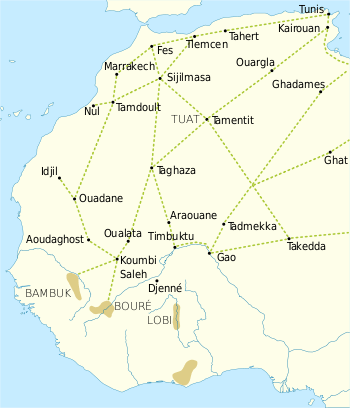 Trade routes of the western Saharan Desert c. 1000 – 1500 Goldfields are indicated by light brown shading.
Trade routes of the western Saharan Desert c. 1000 – 1500 Goldfields are indicated by light brown shading. The Ghana Empire at its greatest extent c. 1050
The Ghana Empire at its greatest extent c. 1050 The successor states to the Ghana Empire c. 1200
The successor states to the Ghana Empire c. 1200 Influence of the Kanem Empire c. 1200
Influence of the Kanem Empire c. 1200- Extent of the Mali Empire c. 1350
 Approximate extent of the Mali Empire, next to the Songhai Empire, c. 1350
Approximate extent of the Mali Empire, next to the Songhai Empire, c. 1350 Constituent states of the Wolof Empire.
Constituent states of the Wolof Empire.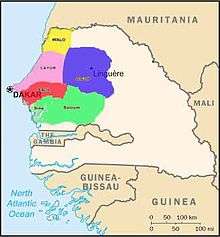 Constituent states of the Wolof Empire c. 1400
Constituent states of the Wolof Empire c. 1400 Carte des peuplades du Sénégal de l'abbé Boilat (1853): an ethnic map of Senegal at the time of French colonialism. The pre-colonial states of Baol, Sine and Saloum are arrayed along the southwest coast, with the inland areas marked "Peuple Sérère".
Carte des peuplades du Sénégal de l'abbé Boilat (1853): an ethnic map of Senegal at the time of French colonialism. The pre-colonial states of Baol, Sine and Saloum are arrayed along the southwest coast, with the inland areas marked "Peuple Sérère".- The Songhai Empire c. 1500
 Bornu Empire territory by 1500
Bornu Empire territory by 1500 The Mali Empire, the Songhai Empire and surrounding states, c. 1530
The Mali Empire, the Songhai Empire and surrounding states, c. 1530 Map of the Pashalik of Timbuktu (yellow-striped) as part of the Saadi dynasty of Morocco (outlined black) within the Songhai Empire (outlined red), c. 1591
Map of the Pashalik of Timbuktu (yellow-striped) as part of the Saadi dynasty of Morocco (outlined black) within the Songhai Empire (outlined red), c. 1591 The Mali Empire and surrounding states, c. 1625
The Mali Empire and surrounding states, c. 1625 Senegambia c. 1707 Waalo marked as Re. D'Oualle in the upper left.
Senegambia c. 1707 Waalo marked as Re. D'Oualle in the upper left.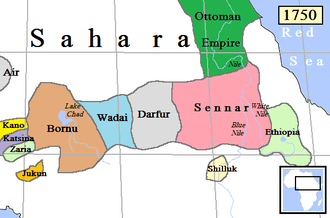 Bornu Empire and eastern Sahelian kingdoms c. 1750
Bornu Empire and eastern Sahelian kingdoms c. 1750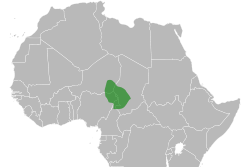 The extent of the Bornu Empire, c. 1750
The extent of the Bornu Empire, c. 1750 Shilluk Kingdom (yellow) and its neighbors, c. 1800
Shilluk Kingdom (yellow) and its neighbors, c. 1800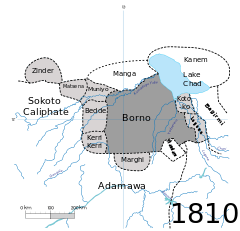 Bornu Empire in 1810
Bornu Empire in 1810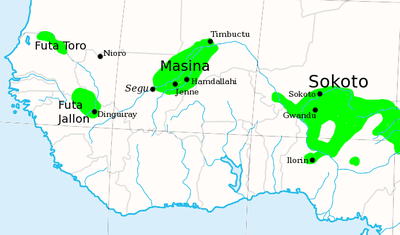 The Fulani Jihad States of West Africa, c. 1830
The Fulani Jihad States of West Africa, c. 1830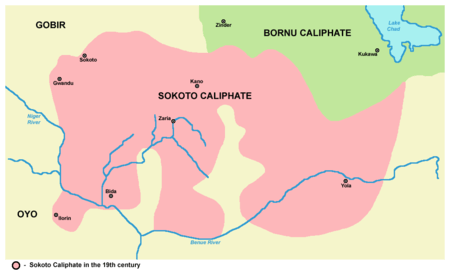 Sokoto Caliphate, 19th century
Sokoto Caliphate, 19th century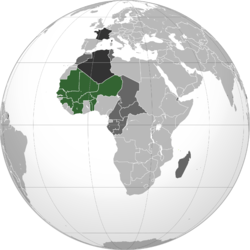 French West Africa (in green) after World War II, and other French possessions (in dark grey).
French West Africa (in green) after World War II, and other French possessions (in dark grey).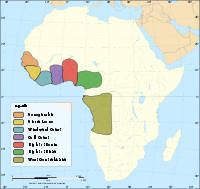 Major slave trading regions of Africa, 15th–19th centuries
Major slave trading regions of Africa, 15th–19th centuries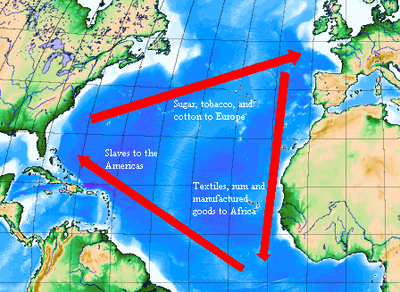 Depiction of the classical model of the triangular trade.
Depiction of the classical model of the triangular trade. Depiction of the triangular trade of slaves, sugar, and rum with New England instead of Europe as the third corner.
Depiction of the triangular trade of slaves, sugar, and rum with New England instead of Europe as the third corner.